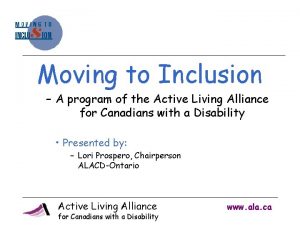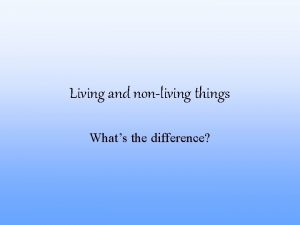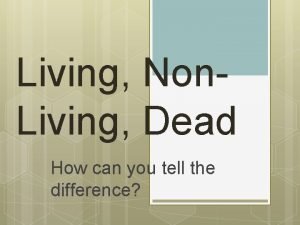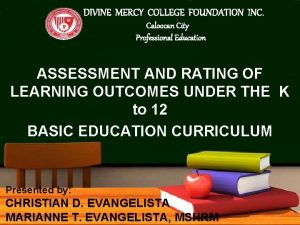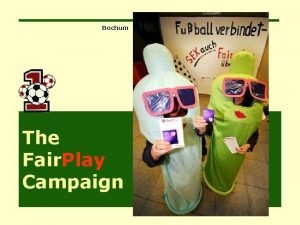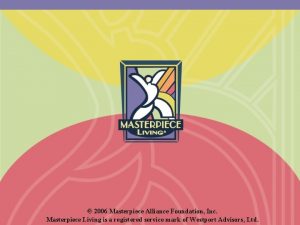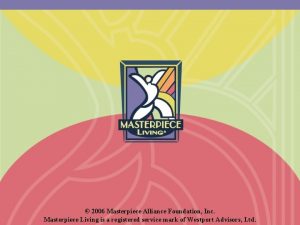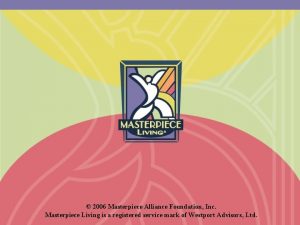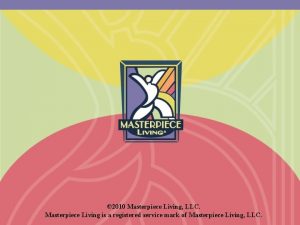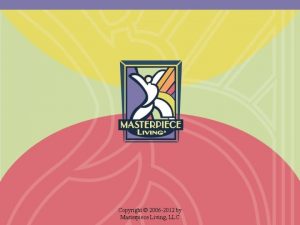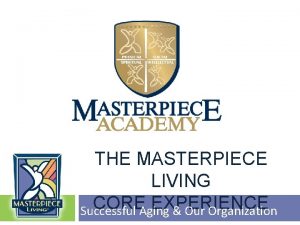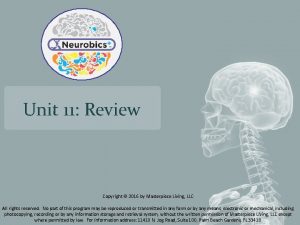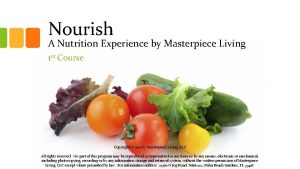2006 Masterpiece Alliance Foundation Inc Masterpiece Living is



















- Slides: 19

© 2006 Masterpiece Alliance Foundation, Inc. Masterpiece Living is a registered service mark of Westport Advisors, Ltd.

Facilitating Successful Aging: The Social Component

What You Will Learn • Myths about aging • Definition of social engagement? • Common social changes as we age • What you can do to facilitate the social engagement of residents

Myths About Aging

Social Aging Myths • Some older adults just like to be alone • Limitations prohibit staying active or doing new things • The elderly don’t pull their own weight • The lights are on, but the voltage is low • ? ?

Societal And Industry Approaches To Retirement Living Outdated Approach • • Paternalistic view of retirement living A time to withdraw from friends, family and activities Focus on decline and belief that it is inevitable Depriving seniors of the opportunity for meaningful social and mental stimulation Masterpiece Living Approach • Factually optimistic view of retirement living • A time to engage in meaningful pursuits: hobbies, social networks, volunteerism • Health-related empowerment • Promotes confidence and purpose about this stage of life • Journey to achieve your personal best

What Is Social Engagement?

What Is Social Engagement? Successful Aging = Physical + Intellectual + Social + Spiritual

What Is Social Engagement? • Network of family and friends (inner circle) • Interaction with environment (outer circle) • Support you can rely on • Participation in enjoyable and meaningful pursuits • Giving back to others • ? ?

Why Be Socially Engaged? Social Engagement Increases: • Confidence • Quality of life & happiness • Feelings of belonging • Longevity • Mental function • Immune Function Social Engagement Helps Prevent: • Isolation & Depression • Declines in physical health (Bandura, 1997) (Berkman & Syme, 1979) (Verghese et al. , 2003) (Cassel, 1976; Berkman & Syme, 1979) (Rowe & Kahn, 1998) (Bosworth &Schaie, 1997; Seeman et al, 1994 & 1995; Uchino et al. , 1995)

Opportunities For Social Engagement can be planned or unplanned. Passive Engaged One-to-one Resident calls staff to schedule transportation Small group Residents listen to Resident-facilitated guest drummer band Bible study and discussion Large group Dinner hour in a large dining room Two residents discuss life over coffee Current events groups with active participation / discussion

Common Social Changes As We Age • Loss of spouse, companion, friends • Physical limitations that modify one’s ability to participate in previous social activities • Giving up driving • Lack of desire/motivation/confidence (or anxiety) to learn or to participate in new activities • Emotional withdrawal • Financial concerns • Changing personal and societal expectations

What Can YOU Do To Help Residents Be Socially Engaged?

What Can You Do? Examine Your Community • Debunk organizational myths • Be familiar with the social opportunities that your community offers • Help develop new ideas for socialization; replace “time fillers” with: • Meaningful experiences • Departmental contributions • Programs based on your interests

What Can You Do? Engage Residents Regularly • Debunk personal myths • Talk to residents about their lives, their history, their interests • Encourage residents to learn about and participate in social activities they might enjoy

What Can You Do? Be Aware If you notice changes in a resident’s behavior: – Show interest, attention, and empathy – Consider all possible causes – Consult with the Masterpiece Living Lifestyle Coordinator – Refrain from “amateur diagnosis”

Case Study Mrs. Jones is an 84 -year-old woman who recently lost her husband. She is very anxious about many aspects of her life. She has not made many friends due to her husband’s illness and rarely leaves her apartment. How would social engagement benefit Mrs. Jones? How do we connect with her? How do we help her get engaged?

Summary • People are social beings, even in older age • Social engagement gives us a sense of purpose and connection, and can improve physical health • As we age, there are many barriers to social connectedness • Masterpiece Living helps overcome these barriers

Questions & Discussion
 You invest in the divinity of the masterpiece meaning
You invest in the divinity of the masterpiece meaning You invest in the divinity of the masterpiece analysis
You invest in the divinity of the masterpiece analysis Alacd
Alacd Composition of urine
Composition of urine Pad foundation section
Pad foundation section Smallest living unit
Smallest living unit Venn diagram of living and nonliving things
Venn diagram of living and nonliving things Is moss living or non-living
Is moss living or non-living Living non living dead
Living non living dead Divine mercy college
Divine mercy college Public health foundation enterprises inc
Public health foundation enterprises inc Peyton manning cleft lip
Peyton manning cleft lip Monarch awards 2006
Monarch awards 2006 Fair play 2006
Fair play 2006 T. trimpe 2003 http //sciencespot.net/
T. trimpe 2003 http //sciencespot.net/ Nom 030 stps 2006
Nom 030 stps 2006 2006 hurricane season
2006 hurricane season Food safety standards act 2006
Food safety standards act 2006 T. trimpe 2006 http://sciencespot.net/
T. trimpe 2006 http://sciencespot.net/ Boardworks ltd 2006
Boardworks ltd 2006


